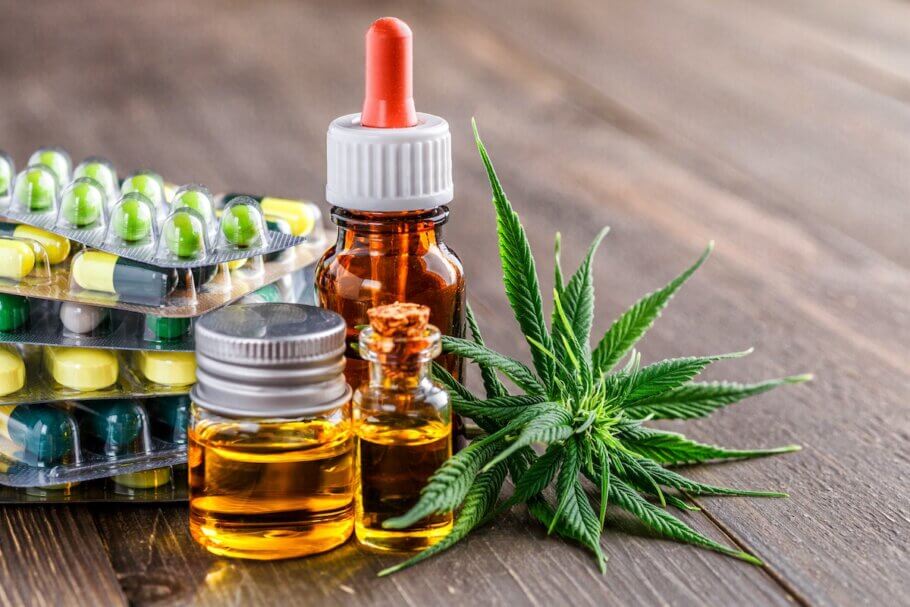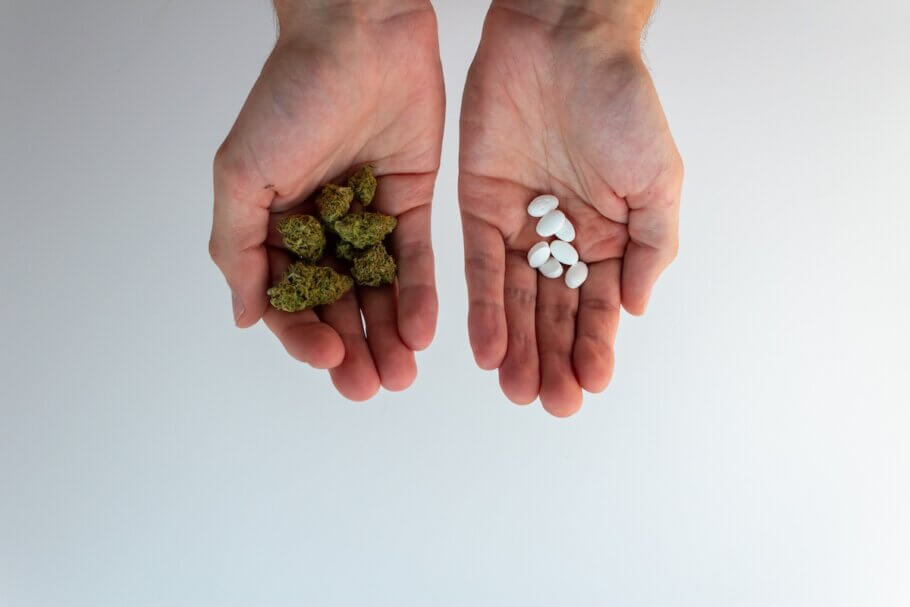The effects of the interaction of cannabis with other drugs
List of contents
Drug interaction is defined as a change in the way a substance works when taken alongside other drugs, medications, or foods. This interaction can be quantified, either by the magnitude of the effects caused, by their duration, or by the physiological conditions of the consumer. Depending on the type of interaction that occurs, it can be classified into three types:
- Additive: when the combination of two substances causes both to produce their effects as they would independently.
- Synergistic: the combination causes these substances to increase their effects compared to when they would separately.
- Antagonistic: the effects of both substances are reduced, so their action is less than when they are taken separately.
Why does cannabis interact with other drugs?
Marijuana interacts with other drugs, generally when they use the same metabolism pathway in our body. The cannabinoids in weed, such as THC and CBD, are metabolized by cytochrome P450. Far from being a single molecule, cytochrome P450 encompasses a whole superfamily of enzymes whose mission in our body is to metabolize a wide variety of xenobiotics, which are those chemicals that are not produced naturally in our body. That is why, when some medications or other drugs of consumption coincide with cannabis in our body, they can give rise to all kinds of effects that perhaps we had not anticipated.

How does cannabis interact with alcohol?
A few years ago, an American study found that alcohol facilitates the absorption of THC and increases its effects, which would explain why consumers mix both substances for recreational purposes. But beware, because it is not such a good idea to mix these drugs. According to recent research (2021), consuming weed and alcohol together further worsens driving ability and also increases risk-taking behaviour in its consumers.
In addition, the mixture of both substances interacts synergistically to increase the reward mechanisms of our brain that favour addiction to these drugs. In this way, you can increase their consumption and the risk of addiction is greater than when they are taken separately.
CBD could reduce alcohol consumption
THC and CBD are two very different cannabinoids, so it is not surprising that their effects are so different when it comes to activating the mechanisms of addiction. Some recent studies have shown evidence that CBD administration could reduce alcohol consumption and lessen the effects of withdrawal on the body. However, more clinical trials are needed for this cannabinoid to help combat alcoholism in patients.
Interaction of cannabis with cocaine
It might seem that the interaction of these drugs is antagonistic and that together they counteract their effects, since cocaine is a stimulant, while some cannabis varieties provoke relaxation and calm. However, nothing is that simple when it comes to the body. Years ago a study showed that marijuana can increase the absorption of cocaine. This is due to the vasodilation capacity of cannabis, which attenuates the vasoconstrictor effect of cocaine, preventing the capillaries from contracting. This increases the body's ability to absorb cocaine more quickly.
On the other hand, cannabis can cause tachycardia (heart palpitations) due to the activation of the CB1 receptor in heart tissue. If we add this to the hypertension and tachycardia caused by cocaine, the combination of both substances can cause heart problems. For this reason, mixing them is not such a good idea.
Interaction of cannabis with psychedelic drugs
From ayahuasca to LSD, through hallucinogenic mushrooms or peyote, psychedelic drugs can have very different effects depending on the dose and the user. These types of substances can distort the perception of the environment, and alter mood and cognition, among others. Also, if they are mixed with cannabis, they can increase their effects due to a synergistic interaction between the two.
This is indicated by a study published in 2021, which concludes that mixing cannabis with this type of drug can increase the intensity and frequency of their psychedelic effects. These were the most prominent effects among the subjects:
- Greater number of "mystical experiences", ranging from feelings of unity and/or transcendence of time and space, to supposed ineffability and sacredness.
- Further dissolution of the ego, an ecstatic state characterised by the loss of boundaries between the subject and the objective world, leading to a supposed "union" of the consumer with the rest of the universe.
- More visual disturbances.

The interaction of cannabis with medicines
Prescription drugs are also considered xenobiotics and can alter their effects in the presence of cannabis.
- Blood-thinning medications, such as warfarin, are used to treat or prevent blood clots in veins or arteries and can cause adverse effects when combined with cannabis. Their interaction is synergistic and can cause bleeding.
- Opioid medications such as morphine or oxycodone can increase their analgesic effect when combined with vaporised cannabis. This would be an additive interaction that could lead to a reduction in the amount of opioids administered to patients in the future and thus reduce the risks associated with these medications.
- Asthma medications like theophylline can also be affected by marijuana. Habitual cannabis consumption increases the evacuation capacity of the medicine by 40%, which reduces its effectiveness dangerously.
- Antipsychotic medications such as clozapine and olanzapine, used to treat mental disorders such as schizophrenia or bipolarity, could also lose their effectiveness when combined with cannabis.
- Sedative medications: According to research, regular cannabis use has been associated with an increased need for sedatives in certain operations and treatments. This is because cannabis could generate resistance to the sedative effects and these users would therefore require higher doses to feel its effects.
How long does it take for cannabis to leave our body?
Now that we know that it may not be advisable to mix cannabis with other substances, we are going to reveal how long cannabinoids remain in our system. To do this, the time it takes for these compounds to be eliminated from the body naturally must be taken into account. THC can remain for up to 24 hours in blood plasma and lipid reserves in regular users. CBD is also slowly eliminated, taking 31 hours to go after the last inhalation and between 2 and 5 days after being consumed daily orally.
Taking into account that the times between these two cannabinoids are so different and that they change depending on the route of administration, it is best to consult your doctor if you are a cannabis user starting with a new medication. Responsible use is born from information, so now that you know the effects produced by the interactions of cannabis with other drugs, you are more prepared to understand, in a conscious way, what happens to your body when you mix certain substances.
-----
References:
- Ethanol increases plasma Δ9-tetrahydrocannabinol (THC) levels and subjective effects after marihuana smoking in human volunteers. Scott E.Luka, Sara Orozco.
- Combined Use of Alcohol and Cannabis: Introduction to the Special Issue. Ashley N. Linden-Carmichael, Jeffrey D. Wardell.
- Marihuana smoking increases plasma cocaine levels and subjective reports of euphoria in male volunteers. S E Lukas, M Sholar, E Kouri, H Fukuzako, J H Mendelson.
- Psychedelic experience dose-dependently modulated by cannabis: results of a prospective online survey. Joanna Kuc, Hannes Kettner, Fernando Rosas, David Erritzoe.












































